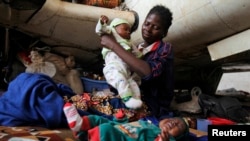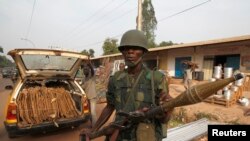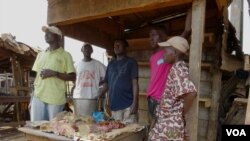BANGUI —
As tens of thousands of Muslims flee the violence in the Central African Republic, the non-governmental organization Oxfam reports that food security and the economy are taking a major hit. Many of the shopowners, herders and traders in the CAR are Muslim.
The Seleka rebel alliance that took power in Bangui last year, but then continued looting and killing may have been the worst thing that has happened to Muslims in the CAR.
Most of the Arabic-speaking militia’s core members happen to share their faith, although there was nothing religious about the Seleka’s objectives.
In the past two months the Seleka has been chased out of most of the western CAR, while Muslims civilians have suffered vicious reprisals.
Now almost all of them have closed their shops in Bangui, and are heading to neighboring countries in trucks or are waiting to be evacuated at the airport.
At the Kilometre Cinq market, the capital’s biggest wholesale market, VOA asked one of the few remaining Muslim traders, Idriss Saleh, where the meat market has gone.
There’s no beef now, he said, the cattle herders have gone with their herds to Cameroon or Chad because there has been a lot of aggression against them, and they do not have security, so they have left.
Idriss has a hardware store and is still doing a little business, but not for long.
He said everyone has gone. Nearly all the Muslim traders have left, and those still here have already packed their bags and are going to leave. As for himself, Idriss said he has packed and was waiting for the convoy.
VOA found one butcher, Mamadou Ali Zairo, with some offal for sale. Prices have soared, he said.
"Before the troubles we have had, you could buy a steer or a heifer here for the equivalent of about $200-$300, but now it would cost about $500 or $600," said Zairo.
Who will replace the Muslim traders? They dominated the wholesale market and many had come from abroad, with capital that most Central Africans did not have.
"The Christians are jealous, they do not know how to do business, they can not buy anything worth $4 or $6. They just buy things worth a dollar or half a dollar, he claims, whereas Muslims are buying goods worth $8 or $10," said Zairo.
He insisted he would carry on and he hoped the government would sort out the problems so that his fellow Muslims could come back. He thought the Chadian government could also help its citizens return.
Oxfam, working with other NGOs including Action against Hunger, has done a survey of the Kilometre Cinq market. Oxfam researcher Steve explained their main finding.
"Many, many of the large wholesalers who really control the food market, who import the food from Chad and from Cameroon which all communities and all faiths depend on, have fled. There were 40 big wholesalers in Bangui, roughly, who imported most of the food, and we have found less than a handful remaining and even those thought they would be leaving in the next few days unless security was rapidly re-established," he said.
As a result, there will be less food all round.
Oxfam is predicting devastating consequences for all communities in the country as supplies of staple foods dry up.
But some people might benefit. VOA visited a town about 80 kilometers from Bangui on Sunday and spoke to a man there who preferred to withhold his identity but was identified by neighbors as a local chief of the anti-balaka militia who have chased out the Muslims.
He said the locality has got itself organized, and has decided that from now on because the Muslims were no longer here, their shops would be allocated to young Christians who have business plans and are capable of running businesses here, while Muslims’ houses would be reserved for government officials.
Since there is currently no CAR army and hardly any police or administrative authority, it seems likely the anti-balaka will have a big say in who gets the shops and houses.
The Seleka rebel alliance that took power in Bangui last year, but then continued looting and killing may have been the worst thing that has happened to Muslims in the CAR.
Most of the Arabic-speaking militia’s core members happen to share their faith, although there was nothing religious about the Seleka’s objectives.
In the past two months the Seleka has been chased out of most of the western CAR, while Muslims civilians have suffered vicious reprisals.
Now almost all of them have closed their shops in Bangui, and are heading to neighboring countries in trucks or are waiting to be evacuated at the airport.
At the Kilometre Cinq market, the capital’s biggest wholesale market, VOA asked one of the few remaining Muslim traders, Idriss Saleh, where the meat market has gone.
There’s no beef now, he said, the cattle herders have gone with their herds to Cameroon or Chad because there has been a lot of aggression against them, and they do not have security, so they have left.
Idriss has a hardware store and is still doing a little business, but not for long.
He said everyone has gone. Nearly all the Muslim traders have left, and those still here have already packed their bags and are going to leave. As for himself, Idriss said he has packed and was waiting for the convoy.
VOA found one butcher, Mamadou Ali Zairo, with some offal for sale. Prices have soared, he said.
"Before the troubles we have had, you could buy a steer or a heifer here for the equivalent of about $200-$300, but now it would cost about $500 or $600," said Zairo.
Who will replace the Muslim traders? They dominated the wholesale market and many had come from abroad, with capital that most Central Africans did not have.
"The Christians are jealous, they do not know how to do business, they can not buy anything worth $4 or $6. They just buy things worth a dollar or half a dollar, he claims, whereas Muslims are buying goods worth $8 or $10," said Zairo.
He insisted he would carry on and he hoped the government would sort out the problems so that his fellow Muslims could come back. He thought the Chadian government could also help its citizens return.
Oxfam, working with other NGOs including Action against Hunger, has done a survey of the Kilometre Cinq market. Oxfam researcher Steve explained their main finding.
"Many, many of the large wholesalers who really control the food market, who import the food from Chad and from Cameroon which all communities and all faiths depend on, have fled. There were 40 big wholesalers in Bangui, roughly, who imported most of the food, and we have found less than a handful remaining and even those thought they would be leaving in the next few days unless security was rapidly re-established," he said.
As a result, there will be less food all round.
Oxfam is predicting devastating consequences for all communities in the country as supplies of staple foods dry up.
But some people might benefit. VOA visited a town about 80 kilometers from Bangui on Sunday and spoke to a man there who preferred to withhold his identity but was identified by neighbors as a local chief of the anti-balaka militia who have chased out the Muslims.
He said the locality has got itself organized, and has decided that from now on because the Muslims were no longer here, their shops would be allocated to young Christians who have business plans and are capable of running businesses here, while Muslims’ houses would be reserved for government officials.
Since there is currently no CAR army and hardly any police or administrative authority, it seems likely the anti-balaka will have a big say in who gets the shops and houses.






